Chicago Booth Alum Pair Give $75 Million to Their Alma Mater
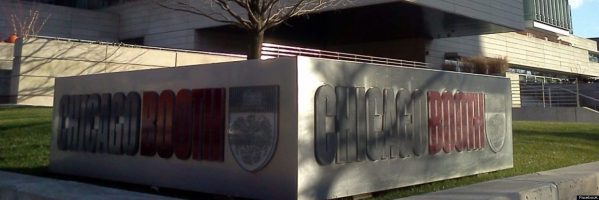
The University of Chicago Booth School of Business’s coffers just grew—and its top scholars will be called by a new name—thanks to a $75 million alumni gift announced today. In recognition of the gift, students who earn highest academic honors while at Booth will be known as the Amy and Richard F. Wallman Scholars, after donors Amy Wallman, MBA’75, and Richard Wallman, MBA’74. The Wallmans’ gift will be used to support several initiatives, including scholarships for students in the full-time, evening, weekend, and executive MBA programs, as well as enhanced co-curricular programming, faculty research, and emerging priorities.
“We have great affection for the University of Chicago—the Booth School of Business is world class, and we hope our gift makes it even better,” Amy Wallman said in a press release. “The Booth School is very special to us not only because we met there,” Richard Wallman added, “but also because we have sponsored 26 scholarship recipients over the years and are delighted to have had a modest impact on these students’ lives.”
Amy Wallman began a 26-year career at EY after completing her Booth MBA, retiring as an audit partner in 2001. She later served as director at pharmaceutical firm Omnicare from 2004 to 2015. Richard Wallman began his post-MBA career with the Ford Motor Company and went on to serve as chief financial officer and senior vice president of Honeywell International Inc., a diversified industrial technology and manufacturing company, and its predecessor AlliedSignal, from 1995 to 2003. He also held senior financial positions with IBM and Chrysler Corporation.
Dean Madhav Rajan, who took the helm at Chicago Booth this past July, welcomed the generous gift, calling it an “endorsement of Chicago Booth’s enduring strengths, in our programs and our extraordinary faculty.” Continued success rests on maintaining and extending the school’s prominence in research and in developing the world’s next leaders, he added.
“The Wallman Scholars will be recognized as preeminent in this cadre of future leaders, modeling the potential and the spirit of their benefactors,” Rajan said. The permanent designation will be bestowed upon graduating MBA students who earn high honors at Booth. It will also be given retroactively to top alumni, according to the school’s press release.
YOU MIGHT ALSO LIKE: Chicago’s Best 1-Year MBA Programs
The Wallmans, for their part, shared that they were impressed with Rajan’s vision for the school and hope their gift will help advance that vision. “This is a unique opportunity to make a difference in the careers of Chicago Booth students for generations to come and express our gratitude to those who have helped us,” Amy Wallman said in the press release. “Our parents were great role models to both of us; they gave us the confidence that we could accomplish anything.”
Richard Wallman also shared appreciation for the impact working for former Honeywell International Chairman and CEO Larry Bossidy had on his career and his life and thanked friends at Centerbridge Partners and Merrill Lynch, whom he called “key enablers of this gift.”
For more about the Wallmans’ $75 million gift to Chicago Booth, click here.
This article has been edited and republished with permissions from Clear Admit.
LBS Opens New Sammy Ofer Centre Expanding Its Teaching Space by 70 Percent

On September 26, the London Business School opened its new, state-of-the-art teaching hub: the Sammy Ofer Centre. Located in Old Marylebone Town Hall, the new center will increase teaching space at LBS by 70 percent. It includes 37 seminar rooms, six new lecture theaters, a new library, and multiple breakout areas. The center also features a mix of classical 1920s structure with the latest in architectural design for a beautiful aesthetic.
Of the new center, LBS Dean François Ortalo-Magné said in a press release: “The school’s London location puts us at the heart of the world’s financial and business community and has shaped our character and success since the early 1960s. The Sammy Ofer Centre embodies the quality of the LBS brand and promotes an exciting future for the school.”
The opening of the Sammy Ofer Centre was made possible due to a fundraising campaign that raised more than £125 million, a portion of which was used to develop the new facility. During the campaign, LBS also received its largest gift ever, a £25 million donation from the Idan and Batia Ofer Family Foundation. Thanks to that generous gift, the new center was named in honor of the late Sammy Ofer KBE, an entrepreneur and philanthropist.
YOU MIGHT ALSO LIKE: The Highest Starting Salaries for London MBA Grads
As for the motivation behind the £25 million donation from the Ofer Family Foundation, Idan Ofer was an MBA graduate from LBS and wanted to give back to the school that helped shape him.
“Seeing the new center with my own eyes has brought alive to me the tremendous spirit of this institution and why it deserves its reputation,” Idan Ofer said in a press release. “LBS is rightly considered among the best in its class, renowned for nurturing the entrepreneurs and leaders of tomorrow, something which has always been close to my heart. I am confident that this wonderful new building will ensure the school is fully equipped to serve the next generation of students and to remain at the front rank of business education worldwide.”
Many school officials and influencers attended the official September 26 opening ceremony for the Sammy Ofer Centre. Among them were Idan and Batia Ofer, the Hon Apurv Bagri, chairman of LBS’s governing body and managing director of the Metdist Group of companies; LBS Dean François Ortalo-Magné, and former LBS Dean Sir Andrew Likierman.
For more on the much-anticipated new addition to the LBS campus, click here.
This article has been edited and republished with permissions from Clear Admit.
Lehigh Alum Donates $5 Million to Business School

Sanjay Shah, CEO of Vistex, Inc., recently donated $5 million to Lehigh University to fund the Vistex Institute for Executive Learning and Research, three decades after he left India to attend the school.
“Lehigh was my gateway to life in the United States. Lehigh will always have a special place for me. The U.S. is my home,” Shah said.
This gift was intended to help Lehigh expand their executive education program.
“This gift is absolutely, positively transformational. The gift allows us to expand our offerings, footprint, and partner with Vistex. It is not just a gift. It is truly an intellectual partnership,” said Georgette Chapman Phillips, dean of the Lehigh College of Business and Economics.
Shah launched his software company in 1999, and gave Lehigh this donation with the hope that Vistex could offer its resources to the executive program.
Shah said, “Since we also work with some of the best known brands in the world I believe that our participation, not just in the commissioning of the institute, but as it also develops and grows, we will be able to bring our clients and their perspectives into the programs as well.”
Historically, Lehigh has not had a developed executive education program. However, in 2016, the school brought on David Welsh to design and direct an executive program.
When asked about the new program, Phillips said, “The whole idea is we want people to never stop learning and we want to be their partner from (age) 18 to 80.”
Shah’s donation will be used to erect a new building and provide a greater wealth of resources to students.
Lehigh President John D. Simon praised Shah for his generosity, saying, “With this support, Mr. Shah is embodying the coward-thinking, impact-driven ethos of Lehigh graduates by utilizing his passion for the university and for lifelong education to support future leaders.”
Harvard Business School Announces Largest-Ever Scholarship Donation

Harvard Business School (HBS) yesterday announced its largest-ever donation for scholarship aid—a $12.5 million pledge that will help support students who were the first in their families to attend college, among others. The pledge comes from HBS alumni Jonathan Lavine, Co-Managing Partner of private investment firm Bain Capital, and his wife Jeannie (both MBA ’92).
The first $10 million will support the Lavine Family Fellowship Challenge Fund, a matching fund designed to motivate others to donate in support of the school’s scholarship needs. The remaining funds will endow two $1 million fellowships—the Lavine Family Fellowship and the Herbert J. Bachelor Fellowship—and provide an additional $500,000 to the HBS Fund for various school priorities.
The Lavine’s have stipulated that, wherever possible, the fellowships be made available to first-generation college graduates in honor of Jeannie’s father, Herbert Bachelor, who was the first in his family to go to college. Bachelor worked 40 hours a week while an undergraduate at Harvard College to cover expenses but still accumulated a large amount of debt, which grew larger still as he earned his MBA from HBS (’68).
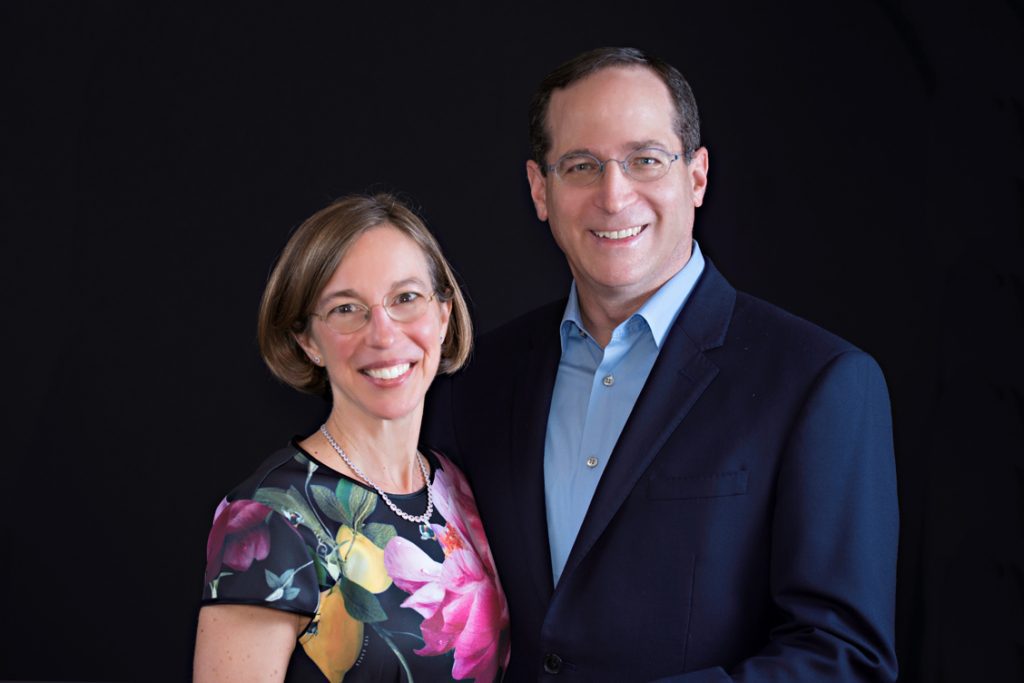
Jeannie and Jonathan Lavine
“It was his dream to have his own children be able to attend college without the stress of holding down a job or the added burden of student debt upon graduation,” said Jeannie Lavine in a press release announcing the gift. She followed in her father’s footsteps, obtaining both her bachelor’s and MBA degrees from Harvard. “He was able to make that dream come true for my siblings and me, and Jonathan and I would like to pay that forward and give other people the same opportunity, especially those who are the first in their family to attend college,” she continued. “We know that intellect is not distributed based on income, and neither should a top education.”
HBS Admissions Is Merit-Based, Need-Blind
HBS prides itself on its merit-based admissions policy, which means that an applicant’s ability to afford tuition does not factor into the admissions process. Once students are admitted, fellowship grants are awarded based solely on financial need. Approximately half of the HBS class receives financial aid each year—$37,000 per student on average—and the school provided $35 million in financial aid to MBA students in the 2016-17 academic year.
“We are thrilled about this gift and grateful to the Lavine family because students who are the first generation in their family to go to college represent an important and needed perspective in the classroom,” HBS Managing Director of Admissions and Financial Aid Chad Losee told Clear Admit. “We admit based on merit and support financially based on need, which makes us different from other business schools,” he added. “Everyone here is here for a reason: because of their talent and merit and what they bring as a leader.”
Close to 10 percent of the HBS class each year is comprised of first-generation college graduates, according to Losee. “We hope this gift and this announcement will help get the word out to people from all different backgrounds who otherwise may feel like HBS isn’t accessible to them,” he said.
Earlier this year, HBS announced another fellowship likewise designed to support students with limited financial means. The Forward Fellowship, announced in July 2017, will award between $10,000 and $20,000 per year to students from lower-income backgrounds above and beyond HBS need-based fellowships. Unlike the HBS need-based fellowships, which are awarded based on students’ individual financial situations, the new Forward Fellowships take into consideration the applicant’s family circumstances and financial history so the available funds can be distributed to those who need them most. These can include not only students who grew up in lower-income households, but also those who plan to provide financial support for their parents during their graduate school careers or after obtaining their MBA.
“We want HBS to be the place where the best leaders from anywhere in the world can come and thrive and be successful,” Losee said. “This most recent gift from the Lavines is great and continues to tell the story that we want to support students when they get here.”
Lavine Family Philanthropic Roots Run Deep
The Lavines’ gift adds to the financial aid resources available to HBS students and builds on the couple’s history of philanthropy, which has long been focused on creating a more equal playing field for all through access to quality education. Jonathan serves as chair of the national Board of Trustees for City Year, an organization focused on reducing the high school dropout rate in U.S. cities. And the couple has also made major contributions to uAspire, an organization focused on providing financial resources to attain a postsecondary education; LIFT, a national nonprofit focused on breaking the cycle of intergenerational poverty; and numerous aid programs at Columbia University, where Jonathan also serves as vice chair of the Board of Trustees.
In addition, they are long-time benefactors and actively involved at Harvard. In 2011, they established the Lavine Family Cornerstone Scholarship Fund to support four undergraduates annually through Harvard’s financial aid program. In 2012, they established the Lavine Family Humanitarian Studies Initiative at the Harvard T. H. Chan School of Public Health to support the training and education of humanitarian relief workers. They also both serve on the dean’s advisory boards at HBS at the School of Public Health and co-chair the latter school’s capital campaign.
“We’re proud to support the work of great academic institutions, because we know first-hand the impact they can have on the world,” said Jonathan Lavine in press release. “There is no greater way to improve someone’s future than giving them access to high quality, post-secondary education. We spent a great deal of time discussing with Dean [Nitin] Nohria our passion for education and how inspired we are by my father-in-law’s journey and appreciative of the opportunity our parents provided us. As a result, we decided that this is the best way to bring those interests together.”
Financial Aid at HBS Is Personal
Losee notes that the newly established Lavine fellowships also help highlight how personal the financial aid process at HBS. “The Lavines will be matched with the individual students they are supporting,” he says. “They will meet them and can develop a mentoring relationship with them.” HBS also features an annual dinner that brings together all HBS donors and the students their gifts help support, he said.
Calling them “the lifeblood of the institution,” Professor Felix Oberholzer-Gee, Senior Associate dean of the MBA program, noted that gifts like the Lavines’ benefit not only the students who receive them but also the school as a whole. “They allow us to focus exclusively on filling our classrooms with the very best students,” he said in a release. “Our learning community is enriched by diversity in all its forms, and the fellowships we offer make it possible to bring people here from all walks of life around the globe.”
Learn more about the Lavines’ $12.5-million gift to support scholarship aid at HBS.
This article has been edited and republished from Clear Admit.
Berkeley Haas Opens Fall 2017 With Its Largest Full-Time MBA Class Ever and New Building
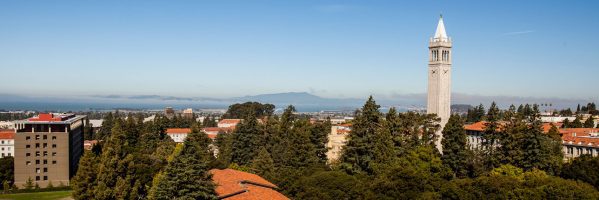
Like many top business schools this time of year, the Haas School of Business at the University of California at Berkeley is welcoming its incoming class of MBA students—but at Haas it’s a bigger group than ever before moving into brand-new digs that promise to be among the greenest in the nation.
There are 284 students in the entering class—32 more than last year—which brings what has long been the smallest leading business school more in line with some of its peers. Plans for next year include additional expansion, to a class size of 300. The grand opening of a new academic building—in progress for the past decade—made increasing the class size possible.
“The intimacy of the class is really an important part of what Haas is about,” Dean Richard Lyons acknowledged in a June interview with Clear Admit. But at just 250 students, where the school has hovered for many years, it has been a gross outlier—a mere third the size of Wharton and not even a third the size of Harvard. “Part of the reputation of the school is a function of its scale, and there are times where you are just not at the right reputational scale—you’re too small,” Lyons continued. “It’s a super intimate experience—there’s no question about that—but target companies want to go to a place where there are enough people graduating that they can send a team of recruiters, for example. If you are too small you are below the threshold.”
“We Don’t Want to Lose the Smallness That Makes Us Unique”
Precisely because the intimacy and close-knit nature of Haas is such an integral part of its culture, the administration, including the admissions team, has approached the process of increasing the class size carefully and thoughtfully. “I think people would be surprised by the amount of care that has been taken to consider potential ramifications,” Peter Johnson, assistant dean for the full-time MBA program and admissions, tells Clear Admit, adding that his team considered necessary adjustments of everything from budgets to graduate student instructors, program office staff to career coaches. “We have been very intentional about it because we don’t want to lose the level of smallness that makes us unique. A lot of our students were very concerned that it not change the experience for future students.”
Not only is the incoming class larger than any before it, it is also one of the strongest academically, Johnson says. Average GMAT scores and GPAs have risen over each of the past three years. The average GMAT score this year was 725—a jump from last year’s 717—and the average GPA climbed, too, from 3.64 to 3.71. Application volume also increased this past year, which meant that though the school admitted more students overall to increase class size, the acceptance rate remained constant at 12 percent. HBS, by comparison, generally accepts approximately 11 percent of its applicants.
The incoming class includes 40 percent women, up slightly over last year though still off from the record 43 percent that made up the Class of 2016. International students drawn from 42 different countries make up 39 percent of the class, up from 38 percent last year. Haas leads HBS, Wharton, and Kellogg in this metric, whose incoming classes are all around 35 percent international. Despite concerns that talk of potential immigration and visa reform under the current administration could have a chilling effect on international application volume, applicants from abroad applied in equal numbers this year as last, Johnson notes. U.S. minority students comprise 29 percent of the class, down from 32 percent last year.
In terms of what they did before coming to Haas, members of the Class of 2019 are an incredibly interesting bunch. Among them are a business development manager from Intel who led development of Google’s self-driving cars, an investment banker who ran from San Francisco to New York City over the summer to raise money and awareness of ALS in honor of his grandmother, a Bain consultant who earned four culinary diplomas in her spare time, a student from Nepal who helped senior political leaders and ex-ministers from five major parties negotiate a new constitution, and the founder and CEO of an Indian irrigation company that saves 4 billion liters of water annually while enabling smallholding farmers to produce 10,000 additional tons of food per year.
A quarter of the incoming students worked in consulting prior to Haas, and another 20 percent worked in finance. In terms of undergraduate degrees, 42 percent studied business or economics, 36 percent hold STEM degrees, and 8 percent graduated with degrees in the humanities.
“Top students from around the world with diverse backgrounds and amazing accomplishments continue to choose us for our distinctive culture,” Morgan Bernstein, executive director of full-time MBA admissions, said as part of an article on the Haas website. “No one else has the culture and community that we do.”
Can Chou Hall be the Greenest Academic Building in the U.S.?
The Haas Class of 2019 is the first to inhabit the newly opened Connie & Kevin Chou Hall, an 80,000-square-foot facility that boasts state-of-the-art classroom technology, flexible learning spaces, and features such as efficient heating, cooling, and lighting systems. These, in addition to rainwater cisterns and 24,300 square feet of exterior windows, helped it earn both LEED Platinum certification and WELL certification (an additional accolade applied to buildings that promote the health and well-being of their users).
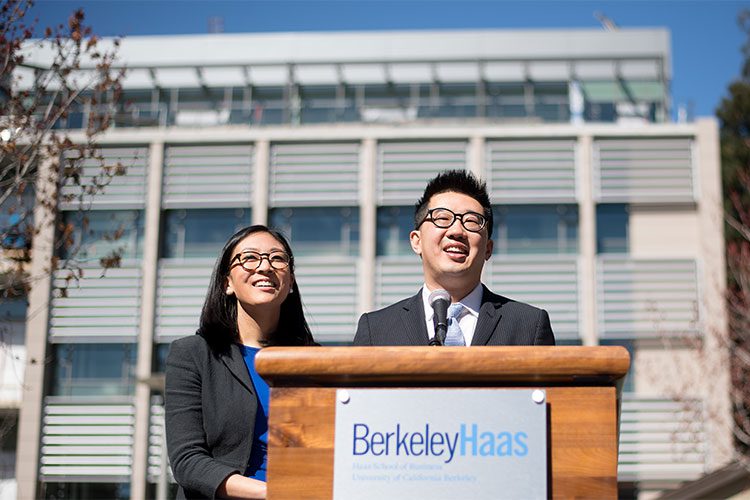
Kevin Chou and Dr. Connie Che appearing at the Berkeley Haas School of Business last March, after announcing their record-breaking school donation (Noah Berger/2017)
The building bears the name of Kevin Chou, BS ’02, founding CEO of mobile gaming company Kabam, and his wife, Dr. Connie Chen, in recognition of their $25 million donation, the largest to date from an under-40 alum. The remaining funds for the $60 million building also came entirely from alumni and friends of the school.
In addition to LEED Platinum and WELL certification, Chou Hall has been designed to divert 90 percent of waste—including through the mandatory use of reusable mugs and water bottles that can be replenished at filling stations and compost and recycling bins on every floor—which will allow it to achieve zero waste certification by summer 2018. This would make it the first business school in the country to do so.

Early-stage concept art for the Connie & Kevin Chou Hall.
There are no places to dispose of other types of trash—encouraging those who use the building to adopt a “’pack-it-in, pack-it-out’ mentality,” according to Courtney Chandler, senior assistant dean and chief strategy and operations officer. “It might take a little getting used to, but we don’t think it will be hard for the Haas community—we’re all about questioning the status quo and redefining business-as-usual,” Chandler said in a story on the Haas website, referring to two of the school’s defining principles.
The building includes eight tiered classrooms and four flexible classrooms, totaling 858 new classroom seats, as well as 28 student and meeting rooms. This provided the much-needed additional space Haas required to expand its class size. A sixth-floor event space will open next month, and a café offering sustainable, locally sourced food—what else—is slated to begin serving students in early 2018.
This article has been edited and republished with permissions from Clear Admit.
Albers School of Business Receives $2.3 Million Donation
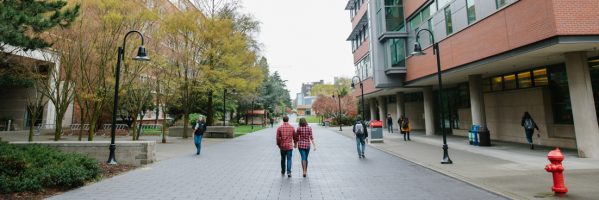
The Seattle University’s Albers School of Business and Economics recently received a $2.3 million donation, one of the largest gifts in the school’s history. The gift came from the estate of Mary Agnes and Raymond Guernsey, a local Seattle couple, and will be used to establish a new scholarship fund. Continue reading…
